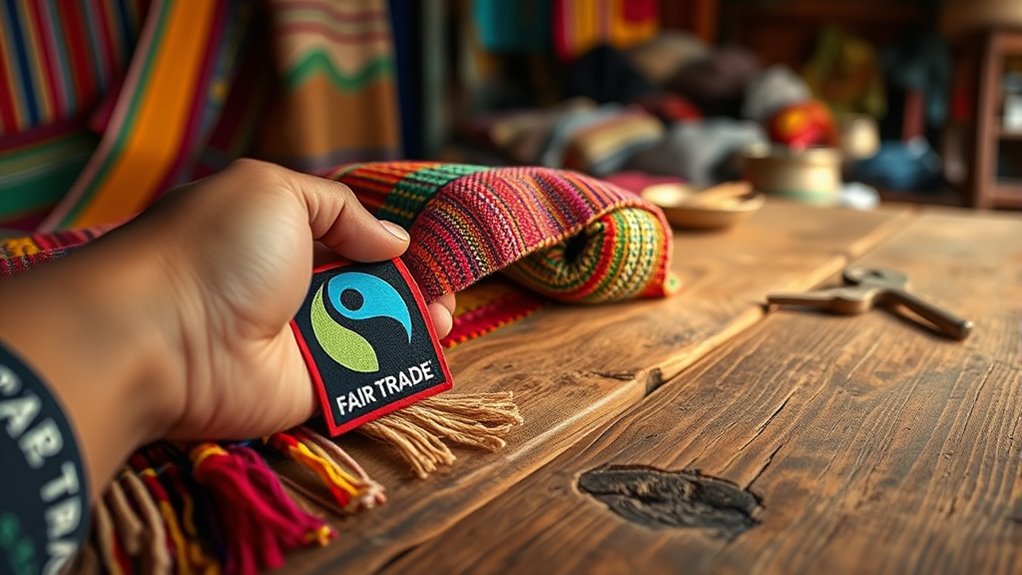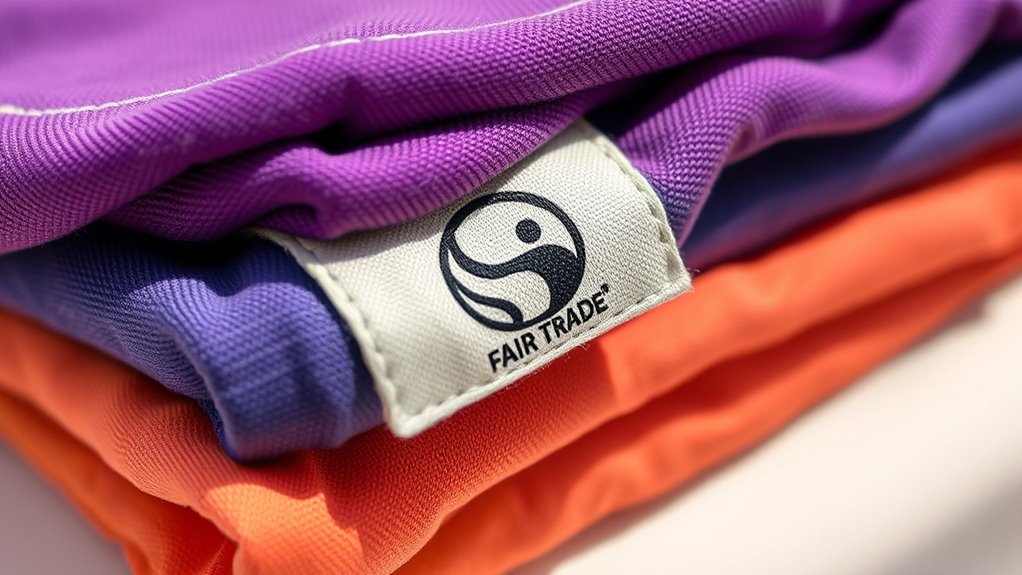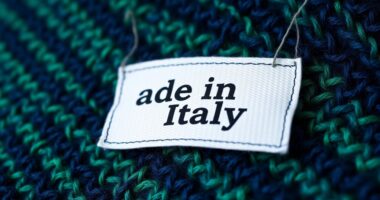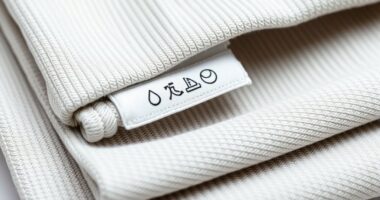Fair trade certifications in apparel are trusted labels that show brands meet strict standards for ethical sourcing, supporting fair wages, safe working conditions, and sustainable practices. They help you identify genuine products from those that might claim to be ethical but aren’t. By understanding these certifications, you can make more conscious choices aligned with your values. If you want to uncover how these labels truly protect workers and the environment, keep exploring the details behind fair trade standards.
Key Takeaways
- Fair Trade certification ensures ethical sourcing, fair wages, and responsible practices throughout the apparel supply chain.
- It helps consumers identify genuine ethically produced clothing and avoid misleading “greenwashed” brands.
- Certification guarantees adherence to social and environmental standards, promoting sustainability and workers’ rights.
- Supporting Fair Trade apparel encourages brands to adopt transparent, responsible manufacturing processes.
- Recognizing Fair Trade labels empowers consumers to make informed choices aligned with their ethical values.

Have you ever wondered what it really means when a product bears a fair trade certification? In the world of apparel, this label isn’t just a badge; it’s a signal that certain standards have been met to promote ethical sourcing. When you see a fair trade label, it indicates that the clothing was produced with a focus on responsible practices that prioritize workers’ rights, fair wages, and sustainable materials. But understanding what this certification entails helps you make more informed choices as a conscious consumer. Consumer awareness of fair trade in apparel isn’t just about recognizing a logo—it’s about grasping the deeper implications behind those three simple words. It means knowing that the product was made with respect for human rights, environmental sustainability, and transparency throughout the supply chain. This knowledge empowers you to support brands that prioritize ethical sourcing, which isn’t always the case in fast fashion or mass-produced garments. When you choose fair trade apparel, you’re helping to guarantee that farmers, factory workers, and artisans receive fair compensation for their work, often in regions where labor rights are vulnerable. It also encourages companies to adhere to strict social and environmental standards, reducing harmful practices like child labor, unsafe working conditions, and environmental degradation. Being aware of these standards is vital because many apparel brands may claim to be ethical without fully adhering to fair trade principles. By understanding the certification’s criteria, you can differentiate between genuine fair trade products and those that use “greenwashing” or misleading labels. This awareness fosters greater accountability in the fashion industry, pushing brands to be more transparent about their sourcing and manufacturing processes. As a consumer, your purchasing decisions carry weight; they can influence brands to adopt more sustainable and ethical practices. Supporting fair trade apparel aligns with a broader movement towards responsible consumerism, where your choices contribute to positive change. It’s not just about buying a piece of clothing but about endorsing a system that values people and planet equally. Ultimately, understanding what fair trade certification stands for helps you navigate the complex world of apparel sourcing, making sure your wardrobe choices align with your values. Being informed turns you into a more conscientious shopper who recognizes the importance of ethical sourcing, not only for the well-being of workers but also for the health of our environment. Recognizing the significance of fair trade standards can help you identify truly ethically produced garments. So, next time you pick out a piece of clothing, look beyond the tags and ask yourself if it reflects the standards that support fair trade principles.
Frequently Asked Questions
How Can Consumers Verify Fair Trade Claims on Apparel?
To verify fair trade claims on apparel, you need to check certification legitimacy. Look for trusted labels like Fair Trade Certified or FLO. Stay informed with consumer awareness campaigns that highlight reputable certifications. Always research the certifying organizations and visit their websites for confirmation. By being diligent, you guarantee the products you buy genuinely support fair labor practices and ethical sourcing, making your choices more impactful.
Do All Fair Trade Certifications Have the Same Standards?
Did you know that over 40 different fair trade certifications exist worldwide? When you look into fair trade apparel, you’ll find certification scope varies widely, meaning some certifications cover only certain aspects like wages or environmental impact. Certification variability means not all standards are the same, so it’s essential to research each cert to understand what guarantees are truly being made. Don’t assume all fair trade labels are equal—verify what each certification actually covers.
What Are the Costs for Brands to Obtain Fair Trade Certification?
You’ll find that the certification process involves thorough assessments of your supply chain and adherence to fair trade standards. Certification costs vary based on your company size, production volume, and the certifying organization. These costs include application fees, annual renewal fees, and sometimes ongoing compliance expenses. While the initial investment can be significant, many brands see it as a way to build consumer trust and demonstrate their commitment to ethical practices.
How Do Fair Trade Certifications Impact Worker Wages?
You might think fair trade certifications are just fancy labels, but they actually make a real difference. They promote worker empowerment by ensuring fair wages and improve wage transparency, so workers know they’re paid fairly. When brands commit to these standards, they help lift workers out of poverty and foster better working conditions. It’s a win-win situation, proving that doing good can also be good for business.
Are There Regional Differences in Fair Trade Certification Requirements?
You’ll find regional standards vary considerably in fair trade certification requirements, leading to certification variability across different areas. These differences depend on local regulations, economic conditions, and industry practices, which can influence how fair trade principles are applied. As a result, some regions might have stricter standards, ensuring better worker protections, while others may be more lenient. It’s important to take into account these regional differences when evaluating fair trade claims in apparel products.
Conclusion
Now that you understand what fair trade certifications really mean, you hold the key to making smarter choices. Think of it like steering through a maze—each label is a sign guiding you toward ethical fashion. When you choose fair trade, you’re not just buying clothes; you’re planting seeds of change, like a gardener nurturing a future where workers thrive. Every conscious purchase is a step closer to a world where fairness is the norm, not the exception.










